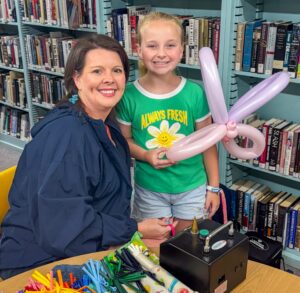RCS holds annual Black History Month program
PHOTO BY MARÍA CAMP - Aaron Freeman directs Russellville Middle School Students in singing the national anthem as part of the annual Russellville City Schools Black History Month program.
PHOTO BY MARÍA CAMP - RHS Class of 1998 graduate Brian McGuire gives the keynote address.
PHOTO BY MARÍA CAMP - RHS junior Eian Nance reads Maya Angelou’s poem entitled “Still I Rise.”
Alejandro Martinez Macias, a seventh grader at Russellville Middle School, reads his poem entitled “My Dream.”
CONTRIBUTED - RHS principal Dr. Jeremy Madden greets Brian McGuire, keynote speaker, for this year’s Russellville City Schools Black History Month program.
Amir Williams introduced the performance of “Lift Every Voice and Sing,” performed by Symia Bell, Airielle Cooper, Matthew James, Devin Jones, Eian Nance and Kalesha Sears, as well as Williams. RMS teacher Aaron Freeman directed and played the piano.
Often referred to as “The Black National Anthem,” it was written as a poem more than a hundred years ago by James Weldon Johnson, a NAACP leader, with his brother, John Rosamond, composing the music. The song became used in the 1950s and 1960s as part of the Civil Rights movement.
Ebony West introduced the recitation of the Pledge of Allegiance and the singing of the national anthem. RMS students Kymani Williams, Jasen Noel, Darron Jones, Zameriya Fuqua, Christian Mosley, Kambreya Abernathy, Jeliyah Jackson, JaZara Byrd and Ariah Wilson, under the direction of Freeman, took part.
Russellville High School senior Matthew James talked about the “why” of Black History Month. Alejandro Martinez Macias, a seventh grader at RMS, read his poem, “My Dream,” which opens with “My dream is for the world to live in peace, for people to be able to live their lives without being hated, for every trace of discrimination to be ceased, for all racism to be faded.”
Zameriya Fuqua, a RMS sixth grader, read her poem, “Rosa Parks.” Kalesha Sears, Symia Bella, Kaleiah Bell and Airelle Cooper presented facts about Black History Month, including sharing the names of some notable African Americans from Alabama, locally including RMS principal Tony Bonds, the first Black administrator for the Russellville City Schools; Annette Harris, the first Black student in RCS; and Sonequa Martin-Green, a film and television star from Russellville.
Others from Alabama mentioned in the program included Lionel Ritchie, a Grammy award-winning singer and songwriter; Bo Jackson, a professional athlete; Octavia Spencer, an Academy award-winning actress; Jesse Owens, an Olympic gold medal track athlete; and Dr. Mae Jemison, the first African American woman to travel to space.
Eian Nance, a junior at RHS, read Maya Angelou’s poem entitled “Still I Rise.” Devin Jones, a senior at RHS, introduced the guest speaker, Brian McGuire, a member of the RHS Class of 1998.
In high school, McGuire was class president, band captain and voted captain of the varsity basketball team. After high school, McGuire attended the University of North Alabama and the University of Alabama at Tuscaloosa. He’s currently employed in the steel field, and he is also a master Mason, a Shriner and is involved in other organizations working to give back to the community.
“Even though it’s been years since I walked the halls of this school, I still keep up with RHS through social media, even though I don’t live here anymore,” McGuire explained. “Russellville is and always will be home. I’ve noticed over the years that y’all have Black History programs. When I was in school not too long ago, that didn’t occur, but I’m happy that it does today.”
McGuire talked about Dr. Martin Luther King’s Aug. 28, 1963 “I Have a Dream Speech,” sharing from it King’s dream to one day live in a nation where people “will be judged, not by the color of their skin, but by the content of their character.” He then asked the audience to consider what the content of their character is, proceeding to define “character” as “the mental and moral qualities distinctive to an individual.”
McGuire observed as he looked into the program audience that he noticed “people of all colors sitting together,” adding “this would not be possible in 1963.”
“In 1963, Dr. King’s children could not attend school with their white counterparts, not because of the content of their character, but because of the color of their skin,” he continued, noting in the same year, McGuire’s own parents couldn’t attend Russellville. “They went to Reedtown School,” he added, “but I’m thankful by the time they were able to attend high school, they did get the chance to attend Russellville High School and graduate.”
He highlighted some of the differences.
“This might seem like a long time ago, but it wasn’t. You are all just a few generations removed from a time when you would’ve gone to separate schools, played on separate teams and even drunk from different water fountains.”
To illustrate, he shared a memory from when he was in high school and told his parents about going to Frosty Inn to socialize with his friends, and they told him about a time when they weren’t allowed to sit inside and eat, instead having to order from and receive their food from a window.
“As I stand here today, I tell you that I’m thankful for the content of Dr. King’s character,” McGuire continued. “He wasn’t free to go into those same restaurants. His kids went to separate schools and even drank from those separate water fountains. Because of the content of his character, he decided that change should come. It wasn’t just Dr. King. There were many included in the Civil Rights struggle. I’m thankful for them. I’m thankful that I was able to attend RHS, graduate from here and that I went on to the University of Alabama and received my Bachelor of Science.”
McGuire said he was able to do those things “because of the ones that stepped out of their comfort zones before me,” adding when he attend the University of Alabama, one of the first places he went was Foster Auditorium, where students used to go to register for classes, noting there’s a star in the concrete there marking the spot where, in 1963, Alabama governor George Wallace stood and said, “Segregation now, segregation tomorrow and segregation forever.”
“I’m glad that wasn’t the case,” McGuire added, going on to share that when he thinks back on his times in the Russellville City Schools, he recalls “the great friends that I made, the great band directors, the great coaches and the great teachers that I had.”
He mentioned the local March 5th election, noting while many in the audience would not yet be old enough to vote, they should consider registering and voting as soon as they can.
“You want to know why it’s imported to me? It’s my personal way to express which candidates will better serve me, and the other reason I always go vote is because there was a time not long ago when people that looked like me weren’t allowed to vote. They were denied the right to vote, not because of the content of their character, but the color of their skin.”
McGuire talked to the audience about an upcoming anniversary of “Bloody Sunday,” an event that occurred March 7, 1965, where 600 protestors who met at the Edmund Pettus Bridge in Selma, Ala., “were savagely beaten because they were trying to get access to vote,” adding prior to that, “there was another protest by other people who wanted to vote,” where Jimmy Lee Jackson was “savagely beaten and murdered by an Alabama state trooper because he wanted the right to vote.”
“Bloody Sunday caused so much national attention that it led to the signing of the Voting Rights Act of 1965,” he continued, “so the reason I get to go and vote every time there’s an election is because of others who came before me, people who literally were beaten and died for that right.”
McGuire ended by saying he wanted to leave the audience with a few key points.
“One, be of good integrity. Your integrity is what you would do even if you don’t think anyone is watching. And by the way, somebody’s always watching. Two, make good use of your time. We all have a set amount of time on this earth, so make good use of it. Your time is something that you can never get back. Three, figure out your talent and use it. Everyone here was given a talent from God. You may be good at something, but make your life better. Use your talent.”
“Last but not least, I ask you to do what’s right even when it’s not popular or even when it’s not comfortable to do so. There’s always going to be good days and bad days in this game called life, but I promise you, the good days will always outweigh the bad. Tough times don’t last, but tough people do.”








